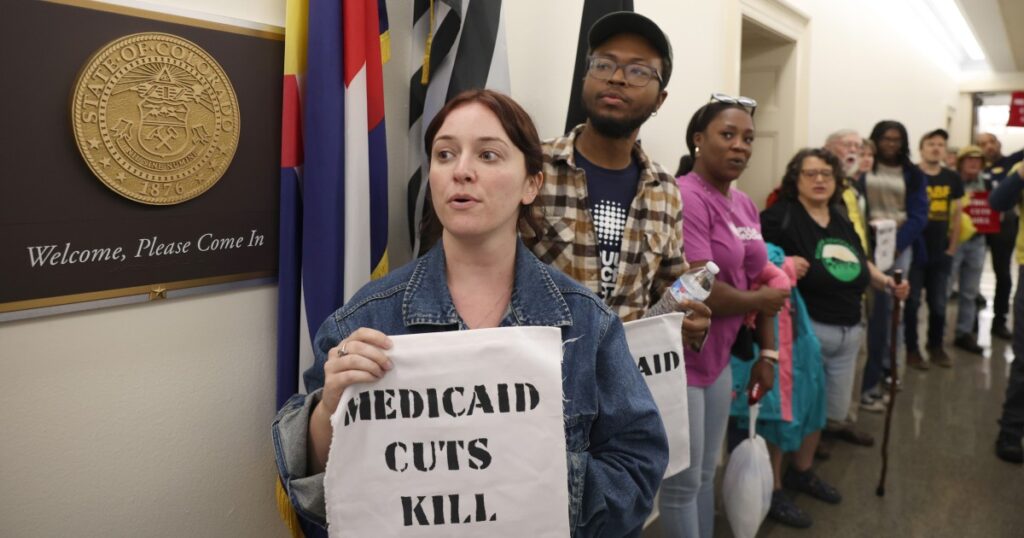Rural hospitals across the U.S. — many already hanging by a thread — could take a serious hit if a proposed Medicaid cut in the Senate’s domestic spending bill is signed into law.
The provision, outlined in the 549-page bill released by the Senate Finance Committee on Monday, would gradually limit states’ use of Medicaid’s so-called provider tax.
Medicaid is jointly funded by the federal government and states. States cover the upfront cost of care and then are reimbursed by the federal government for at least 50%.
The provider tax is a state-imposed fee on hospitals and other health care providers to help fund a state’s share of the Medicaid program. When states use provider funds to boost their Medicaid spending, the federal government gives them more money because it’s required to match it.
The tax must apply to all providers within a class — so if a state wants to tax hospitals, it must include all licensed hospitals. Most states have multiple provider taxes, including taxes for nursing facilities and ambulance services, said Edwin Park, a research professor at the Georgetown University McCourt School of Public Policy who focuses primarily on Medicaid.
All states, except for Alaska, have at least one provider tax, Park said. A good chunk of the money raised goes toward supporting rural hospitals, which often serve a higher share of low-income and Medicaid patients.
“It’s a key financing source for rural hospitals, which tend to have much thinner operating margins,” Park said. In recent years, he added, rural hospitals have “had a rash of closures, staff cuts and service cuts” due to financial hardship.
A report from the Center for Healthcare Quality and Payment Reform, a think tank, found that one-third of all rural hospitals are at risk of closing.
The Senate proposal would gradually reduce the provider’s tax rate of 6% or less to 3.5% by 2031, according to Monday’s outline. States that haven’t expanded Medicaid, such as Florida and Texas, would get to keep their rates at their current levels.
Taxes on nursing homes and intermediate care facilities, which provide services for people with disabilities, are exempt from the new limit.
Dr. Adam Gaffney, a critical care physician and assistant professor at Harvard Medical School, said the Senate’s proposal is more aggressive than the House’s version, which proposes freezing the provider tax rate at its current level and barring states from implementing new taxes.
Gaffney published a study on Monday that found the Medicaid cuts proposed in the House bill could cause an estimated 7.6 million Americans to lose health insurance, leading to thousands of preventable deaths.
Under the Senate’s proposal, Gaffney said rural hospitals will likely be forced to reduce the services they offer, cut staff or close altogether. Many more patients would also likely die, he added, because they no longer have a hospital nearby.
A report from the Pew Research Center found rural Americans live an average of 10.5 miles or 17 minutes from the nearest hospital — about twice as far and five to seven minutes longer than people in suburban and urban areas.
“There’s no way around it. It’s just basic math,” Gaffney said. “It means more harm, and that more people will die from lack of care.”
Gaffney said Republicans should be taking steps to keep hospitals in rural areas, where many of their voters live, open.
“At the end of the day, hospitals that are in places where patients are poor tend to be poor and to be more at risk of closure,” he said.
Kevin Stansbury, the CEO of the Lincoln Community Hospital, a 25-bed rural hospital in Hugo, Colorado, said his business is unlikely to survive under the proposed changes.
Stansbury said his hospital serves an area roughly the size of Connecticut but has only about two providers per square mile. About 25% of his patients are on Medicaid.
The hospital receives about $300,000 a month in provider tax reimbursements, which he said are “essential for us to keep our doors open” and is still only enough to break even.
Without the 6% provider tax rate, he will likely have to start cutting services for patients, including long-term care, he said.
“If I start crying, forgive me,” Stansbury said. “It just breaks my heart.”
The proposed cuts in the Senate bill are not final and may not end up in the version that reaches President Donald Trump’s desk.
If the Senate’s provider tax changes do make it through to the final bill, they are likely to be deeply unpopular among the public, said Robin Rudowitz, director of the program on Medicaid and the uninsured at KFF, a nonprofit group that focuses on health policy.
Polling shows that about 3 in 4 rural residents say funding for Medicaid should increase or stay the same, Rudowitz said. About three-quarters of people living in rural areas, she added, say that Medicaid is very important to people in their communities.
“Changes that would restrict or retrench coverage gains could have negative implications for these hospitals,” she said.
Rural hospitals groups are already pushing back on the proposed limits on the provider tax.
In an emailed statement, Bruce Siegel, the president and CEO of America’s Essential Hospitals, a nonprofit group that advocates for hospitals serving poor communities, said the Senate’s changes “would devastate health care access for millions of Americans and hollow out the vital role essential hospitals play in their communities.”
In a release Tuesday, Sen. Ron Wyden, D-Ore., the ranking member of the Senate Finance Committee, slammed the proposed cuts.
“Senate Republicans would pay for those new corporate tax breaks by making even deeper cuts to Medicaid, slashing funding for rural hospitals and other essential health care providers and throwing cash-strapped states off a funding cliff,” Wyden said.

